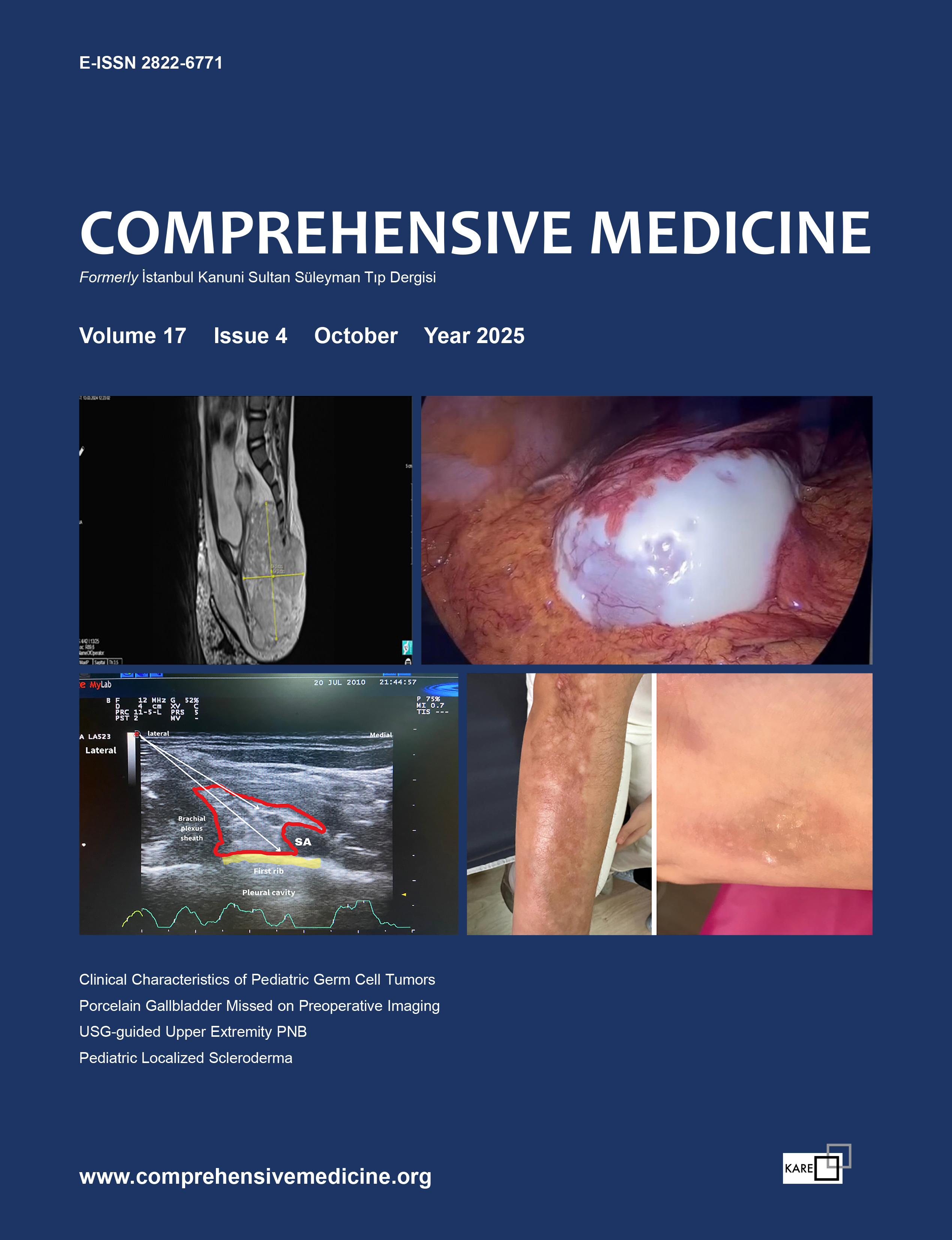The Effects of Colchicine Treatment on Cardiac and Inflammatory Markers in COVID-19 Patients Followed Up in Intensive Care Unit
Mikail Akın1, Kadir Arslan2, Ebru Kaya2, Ayça Sultan Şahin21Department of Anesthesiology and Reanimation, Bitlis State Hospital, Bitlis, Türkiye2Department of Anesthesiology and Reanimation, University of Health Sciences, Kanuni Sultan Süleyman Training and Research Hospital, İstanbul, Türkiye
INTRODUCTION: It has been stated that colchicine can reduce the cytokine storm and inflammation in cardiac myocytes during COVID-19 infection. This study aims to investigate the effect of colchicine treatment on cardiac and inflammatory markers in COVID-19 patients followed in the intensive care Unit (ICU) of a tertiary center.
METHODS: Patients followed up in the ICU with the diagnosis of COVID-19 between April 2020 and June 2020 were evaluated retrospectively. Patients who received standard treatment in moderate-to-severe COVID-19 patients were analyzed by classifying them as the control group and patients who were added to the standard treatment within the first 48 h as the colchicine group.
RESULTS: A total of 79 patients, 39 in the colchicine group and 40 in the control group, were included in the study. Demographic data and the presence of comorbid disease were similar between groups. The mean length of stay in the ICU was 19.4±8 days in the colchicine group and 14.7±7 days in the control group. The length of stay in the ICU was found to be significantly higher in the colchicine group (p=0.017). There was no significant difference between the groups in terms of C-reactive protein, Interleukin-6, troponin T and D-dimer levels, and 28-day mortality (94.9% vs. 95%, p>0.05).
DISCUSSION AND CONCLUSION: Adding oral colchicine to the standard treatment within the first 48 h after hospitalization in moderate-to-severe COVID-19 patients followed in the ICU did not improve the clinical status of the patients. It did not reduce cardiac and inflammatory markers and mortality rates.
Keywords: Colchicine, COVID-19, CRP, D-dimer, inflammation, troponin T
Yoğun Bakım Ünitesinde Takip Edilen COVID-19 Hastalarında Kolşisin Tedavisinin Kardiyak ve İnflamatuar Belirteçler Üzerine Etkileri
Mikail Akın1, Kadir Arslan2, Ebru Kaya2, Ayça Sultan Şahin21Bitlis Devlet Hastanesi, Anesteziyoloji ve Reanimasyon Kliniği, Bitlis2Sağlık Bilimleri Üniversitesi, Kanuni Sultan Süleyman Eğitim ve Araştırma Hastanesi, Anesteziyoloji ve Reanimasyon Kliniği, İstanbul
GİRİŞ ve AMAÇ: Kolşisinin COVID-19 enfeksiyonu sırasında görülen sitokin fırtınasını ve kardiyak miyositlerdeki yangıyı azaltabileceği belirtilmiştir. Bu çalışmanın amacı tersiyer bir merkezin Yoğun bakım ünitesinde (YBÜ) takip edilen COVID-19 hastalarında kolşisin tedavisinin kardiyak ve inflamatuar belirteçler üzerindeki etkisinin araştırılmasıdır.
YÖNTEM ve GEREÇLER: Nisan 2020 ile Haziran 2020 tarihleri arasında COVID-19 tanısıyla YBÜ’de takip edilen hastalar retrospektif olarak değerlendirildi. Orta-ağır düzeydeki COVID-19 hastalarında standart tedavi uygulanan hastalar kontrol grubu ve standart tedaviye ilk 48 saat içerisinde oral kolşisin eklenen hastalar kolşisin grubu olarak sınıflandırılarak analiz edildi.
BULGULAR: Çalışmaya kolşisin grubunda 39 ve kontrol grubunda 40 olmak üzere toplam 79 hasta dahil edildi. Demografik veriler ve komorbit hastalık mevcudiyeti gruplar arasında benzerdi. Ortalama YBÜ’de kalış süresi kolşisin grubunda 19.4±8, kontrol grubunda 14.7±7 gün idi. YBÜ’de kalış süresi kolşisin grubunda anlamlı olarak yüksek bulundu (p=0.017). C-reaktif protein (CRP), İnterlökin-6 (IL-6), troponin T ve D-dimer düzeyleri ve 28 günlük mortalite açısından gruplar arasında anlamlı farklılık saptanmadı (%94.9 vs. %95, p>0.05).
TARTIŞMA ve SONUÇ: YBÜ’de izlenen orta-ağır COVID-19 hastalarında yatış sonrası ilk 48 saat içinde standart tedaviye oral kolşisin eklenmesi hastaların klinik durumunu iyileştirmemiş, kardiyak ve inflamatuar belirteçler ve mortalite oranlarında azalma sağlamamıştır.
Anahtar Kelimeler: Kolşisin, COVID-19, CRP, D-dimer, inflamasyon, troponin T
Manuscript Language: English






















